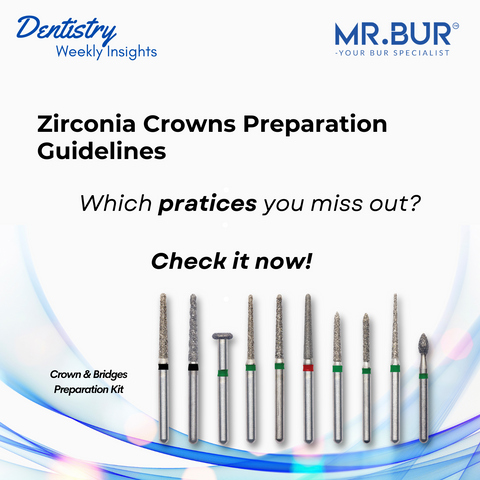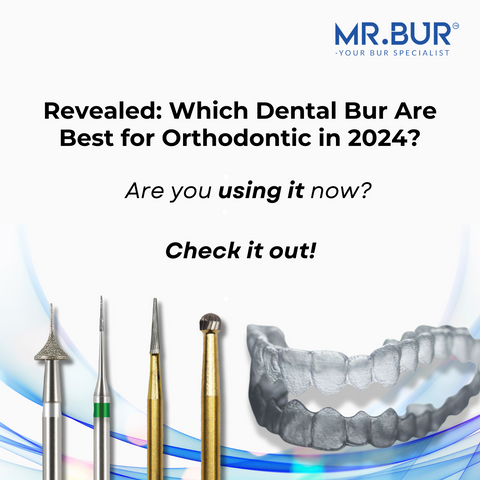As a dental professional, you know that the right tools can make all the difference in the success of your procedures. Laboratory burs are among the most vital instruments in any dental lab. Their precision, versatility, and efficiency can significantly impact the quality of your work. In this article, we'll explore the six essential laboratory burs every dental technician should have and why they are indispensable in lab use.
The Role of Laboratory Burs in Lab
What are laboratory burs used for?
Laboratory burs are rotary cutting instruments used in dental labs for various procedures, including cutting, shaping, and finishing dental materials such as denture, plaster, precious alloys, non-precious alloys, model casting alloys, acrylics and etc. These burs come in different shapes and sizes, each designed for specific tasks.
Materials and Construction
The performance of a bur largely depends on the material it's made from. Common materials include carbide burs and diamond. Tungsten Carbide burs are known for their durability and ability to maintain sharpness, while diamond Burs offer exceptional precision and are ideal for fine detailing.
Criteria for Selecting Essential Burs
Quality and Durability
High-quality burs last longer and perform better. Investing in durable burs can save time and money in the long run by reducing the need for frequent replacements.
Versatility
Burs that can handle a variety of tasks are invaluable in a dental lab. Versatile burs reduce the need for multiple instruments, streamlining procedures and improving efficiency.
Precision and Efficiency
The right burs can enhance the precision of your lab work, leading to better outcomes for the materials. Efficient burs allow you to complete procedures faster without compromising on quality.
The 6 Essential Laboratory Burs
TC125 Relief-Ground Cutters: ISO 176 Straight Edge with Spiral Cut
Relief-Ground Cutters Bur offers low-vibration operation, ensuring smoother cutting and optimal heat dissipation to prevent workpiece melting. It is perfect for preparing acrylics, permanent soft acrylic, hard plasters, and double-layer silicone, providing improved blade protection against edge breakage for extended cutter lifespan.

TC103 Carbon Diamond Coating: ISO 190 Cross Cut Standard
Carbon Diamond Coating greatly strengthen the durability of burs, making them particularly effective for trimming plaster and 3D dentures. It increases sharpness, leading to better cutting efficiency. The new cutting edge design reduces clogging, while low vibrations and smoother cutting enhance the overall operation.
TC16 Carbide Cutter: ISO 223 Cross Cut Super Coarse
Coarse Plain Cut and Coarse Cross Cut is suitable and works on plaster, non-precious alloy, precious alloy, model casting alloy, tray material and acrylics.
TC7 Carbide Cutter: ISO 175 Plain Cut Standard
Medium Plain Cut are burs that excel in working with plaster, precious alloys, non-precious alloys, model casting alloys, and acrylics. Their suitability spans across various dental procedures, including restorative work and denture techniques.
TC11F Carbide Cutter: ISO 140 Cross Cut Fine
Fine Cross Cut burs are designed for use on a variety of materials including precious alloys, non-precious alloys, model casting alloys, acrylics, and ceramics. They are crucial burs for restorative procedures, denture techniques, and for trimming cobalt chrome.
TC39SF Carbide Cutter: ISO 110 Cross Cut Super Fine
Super Fine Cross Cut burs are versatile and effective, ideal for use on precious alloy, model casting alloy, acrylics, and ceramic materials. Perfect for restorative dentistry, prosthodontics, denture techniques, as well as trimming and polishing tasks.
At MR. BUR US, our strict adherence to relevant regulations guarantees our commitment to quality and safety.
Diamond Burs, Carbide Burs, Surgical & Lab Use Burs, Endodontic burs, IPR Kit, Crown Cutting Kit, Gingivectomy Kit, Root Planning Kit, Composite Polishers, High Speed Burs, Low Speed Burs
Subscribe our newsletter now!







